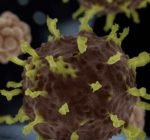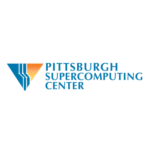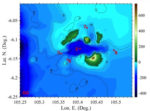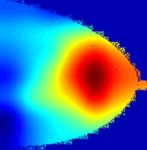A $750,000 grant from the National Science Foundation will continue a lab-computer collaboration that accurately simulated communications between nerve cells and muscle cells. The project has immediate applications in treating a type of neurological disease called Lambert-Eaton Myasthenic Syndrome (LEMS). It also offers fundamental insights into how nerve cells communicate with muscle cells in health […]
$750,000 Grant to Research of Nerve-Muscle Communication at Pittsburgh Supercomputing Center, Pitt
Anton 2 at PSC for Coronavirus Binding Simulation, COVID-19 Test Development
A team at the University of Arkansas is using the Pittsburgh Supercomputing Center’s Anton 2 system to simulate molecular systems for microseconds or longer to investigate how the Coronavirus that causes COVID-19 attaches to human cells, PSC reported. Anton 2, developed by privately held D. E. Shaw Research (DESRES) of New York, is a special-purpose, […]
AI Supercomputer at PSC to Combine Cerebras ‘World’s Largest Chip’ and HPE Superdome Flex
The Pittsburgh Supercomputing Center has won a $5 million award from the National Science Foundation to build Neocortex, an AI supercomputer that incorporates the Cerebras Systems Wafer Scale Engine technology introduced last year along with Hewlett Packard Enterprise’s shared memory Superdome Flex hardware. PSC, a joint research organization of Carnegie Mellon University and the University […]
Video: Evolving Cyberinfrastructure, Democratizing Data, and Scaling AI to Catalyze Research Breakthroughs
Nick Nystrom from the Pittsburgh Supercomputing Center gave this talk at the Stanford HPC Conference. “The Artificial Intelligence and Big Data group at Pittsburgh Supercomputing Center converges Artificial Intelligence and high performance computing capabilities, empowering research to grow beyond prevailing constraints. The Bridges supercomputer is a uniquely capable resource for empowering research by bringing together HPC, AI and Big Data.”
XSEDE Supercomputers Simulate Tsunamis from Volcanic Events
Researchers at the University of Rhode Island are using XSEDE supercomputer to show that high-performance computer modeling can accurately simulate tsunamis from volcanic events. Such models could lead to early-warning systems that could save lives and help minimize catastrophic property damage. “As our understanding of the complex physics related to tsunamis grows, access to XSEDE supercomputers such as Comet allows us to improve our models to reflect that, whereas if we did not have access, the amount of time it would take to such run simulations would be prohibitive.”
Pittsburgh Supercomputing Center Resources Available for COVID-19 Research
The Pittsburgh Supercomputing Center (PSC), a joint effort between Carnegie Mellon University and the University of Pittsburgh, has allotted computing time on its Bridges and Bridges-AI platforms for urgent COVID-19 computational research. These resources are available at no cost to scientists. “PSC is part of the COVID-19 HPC Consortium, which encompasses computing capabilities from some of the most powerful and advanced computers in the world. By contributing to this combined effort, the PSC aims to empower researchers around the world to accelerate understanding of the COVID-19 virus and the development of treatments and vaccines that will help to address infections and limit spread of the virus.”
Deep Learning for Predicting Severe Weather
Researchers from Rice University have introduced a data-driven framework that formulates extreme weather prediction as a pattern recognition problem, employing state-of-the-art deep learning techniques. “In this paper, we show that with deep learning you can do analog forecasting with very complicated weather data — there’s a lot of promise in this approach.”
AI on XSEDE Systems Promises Early Prediction of Breast Cancer
Researchers are using XSEDE supercomputers and artificial intelligence to predict breast cancer. “Our local GPUs did not have enough memory to accommodate such a scale of data for AI modeling. It could take weeks to run one experiment without the support of powerful GPUs. Using the GPUs from XSEDE, with larger memory, reduced that to a couple of hours.”
Bill Kramer to Lead Pittsburgh Supercomputing Center
William Kramer has been selected as the next director of the Pittsburgh Supercomputing Center. “It’s our great fortune to recruit Bill, who is known and honored nationally for his leadership and innovations in the world of supercomputing,” said Rob A. Rutenbar, senior vice chancellor for research at the University of Pittsburgh. “In many ways, his career path is emblematic of the role of supercomputing in modern scientific research. The field has grown specifically because of his innovations and commitment.”
Job of the Week: Director of Facilities Technologies at PSC
The Pittsburgh Supercomputing Center is seeking a Director of Facilities Technologies in our Job of the Week. “In this role, you will be responsible for directing all operations for PSC high-performance computing and storage resources, as well as planning, design, deployment, installation, maintenance and operation of future HPC systems.”











